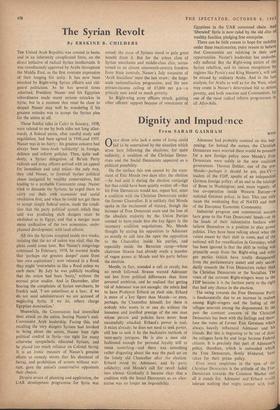The Syrian Revolt
By ERSKINE B. CHILDERS THE United Arab Republic was created in baste, and in an inherently complicated form, on the direct initiative of radical Syrian intellectuals. It was tumultuously approved by Arabs throughout the Middle East, as the first concrete expression of their longing for unity. It has now been smashed by Right-wing Syrian officers and old- guard politicians. As he has Several times admitted, President Nasser and his Egyptian subordinates made many serious mistakes in Syria; but in a moment that must be close to despair Nasser may well be wondering if his greatest mistake was to accept the Syrian plea for the union at all.
Those fateful talks in Cairo in January, 1958, were related to me by both sides not long after- wards. A federal union, after careful study and' negotiation, had been agreed in 1956.and 1957. Nasser was in no hurry: his greatest concern had always been intra-Arab 'solidarity' in foreign, defence and reform policies. Then, quite sud- denly, a Syrian delegation of Ba'ath Party radicals and army officers arrived with an appeal for immediate and total union—the only way, they told Nasser, to forestall Syrian political chaos instigated by wealthy conservatives, but leading to a probable Communist coup. Nasser tried to dissuade the Syrians; he urged them, to carry out their own economic and social revolution first; and when he could not get them to accept simply federal union, made the condi- tion that the party political system which they said was producing such dangers must be abolished as in Egypt, and that a merger must mean unification of the two economies, under planned development, with land reform.
All this the Syrians accepted inside two weeks, insisting that the act of union was vital; that the plans could come later. But Nasser's misgivings continued. In February, 1958, he warned Arabs that 'perhaps our greatest danger' came from 'our own aspirations': now released in a flood, they might 'overwhelm us like a flood unless we curb them.' By July he was publicly recalling that the union had been 'hasty,' without the normal prior studies. And in December, after hearing the complaints of Syrian merchants, he frankly said, 'I am sometimes at a loss: if we do not send administrators we are accused of neglecting Syria; if we do, others charge Egyptian domination.'
Meanwhile, the Communists had intensified their attack on the union, fearing Nasser's anti- Communist Arab leadership. Facing this, and recalling the very dangers Syrians had invoked to bring about the union, Nasser kept tight political control in Syria—too tight for many otherwise sympathetic educated Syrians, and he placed too much reliance on Colonel Serraj. It is an ironic measure of Nasser's genuine efforts to remedy errors that his dismissal of Scrraj, and prohibition of arrests without war- rant, gave the union's conservative opponents their chance.
Despite errors of planning and application, the UAR development programme for Syria was sound; the mass of Syrians stood to gain great benefit from it. - But for the urban class of Syrian merchants and middle-class elite, accus- tomed to an almost nineteenth-century freedom from State controls, Nasser's July measures of 'Arab Socialism' were the last straw: the large- scale nationalisation programme, and the new private-income ceiling bf £5,000 net p.a.—a princely sum amid so much poverty.
So Right-wing army officers struck, gaining other officers' support because of resentment of Egyptians in the UAR command chain. And 'liberated' Syria is now ruled by the old elite of wealthy families, pledging free enterprise.
There can be little reason to hope for stability under these reactionaries; every reason to believe that Communists are rejoicing in their new opportunities. Nasser's leadership has undoubt- edly suffered. But the Right-wing nature of the Syrian rebellion, and its instant recognition by regimes like Persia's and King Hussein's, will not be missed by ordinary Arabs. And in the last analysis, for Arabs as well as for the West, what may count is Nasser's determined bid to defeat poverty, and both reaction and Communism, by one of the most radical reform programmes in all Afro-Asia.














































 Previous page
Previous page